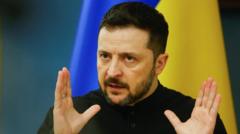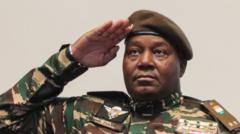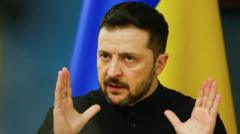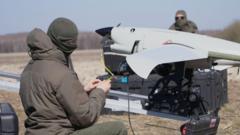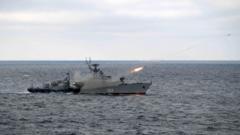North Korean leader Kim Jong Un has been photographed reviewing AI-equipped suicide drones as part of a military expansion plan. The development of this technology, likely supported by Russian assistance amid ongoing military ties, poses security concerns for South Korea and the international community.
North Korea's Kim Jong Un Inspects AI-Enhanced Suicide Drones Amid Tensions
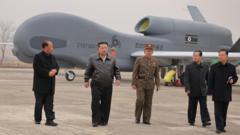
North Korea's Kim Jong Un Inspects AI-Enhanced Suicide Drones Amid Tensions
The North Korean leader evaluates the production of advanced drones, raising international concerns about military collaboration with Russia.
North Korean leader Kim Jong Un has recently been seen inspecting a new line of suicide drones that are reportedly equipped with artificial intelligence (AI). The images were released by the Korean Central News Agency (KCNA) and depict Kim on a runway with military officials evaluating the drones. State media indicated that Kim has authorized plans to enhance the production of these advanced military technologies.
Military analysts are expressing concerns over North Korea's drone program, suggesting that its advancement has possible connections to support from Russia. The developing relationship between the two nations, particularly their military collaboration, was emphasized by James Patton Rogers, an expert from the Cornell Brooks Tech Policy Institute. He noted that the presence of loitering munitions, which are designed to crash into targets using their built-in warheads, highlights the outcomes of the close ties forged over recent years.
In addition to the drone announcement, Kim did reveal what might be North Korea's first airborne early-warning aircraft, designed to utilize radar systems for an aerial view of combat scenarios. South Korean officials have stated that assessing the effectiveness of this aircraft will require further time, with indications that some of its components may also be linked to Russian technology.
Concerns have escalated given that Kim is suspected of supplying arms to Russia while simultaneously receiving technology that could enhance North Korea's missile capabilities. This reciprocal relationship was formally agreed upon during a pact signed between Kim and Vladimir Putin last June, which outlined mutual support in the face of external threats. Intelligence from South Korea indicates that North Korea has not only dispatched more soldiers to Russia but also repositioned others along the frontlines in Ukraine, resulting in casualties among North Korean fighters.
As these developments unfold, the potential implications for regional security raise alarm bells across South Korea and the broader international community, notably regarding the stability of the Korean Peninsula.









